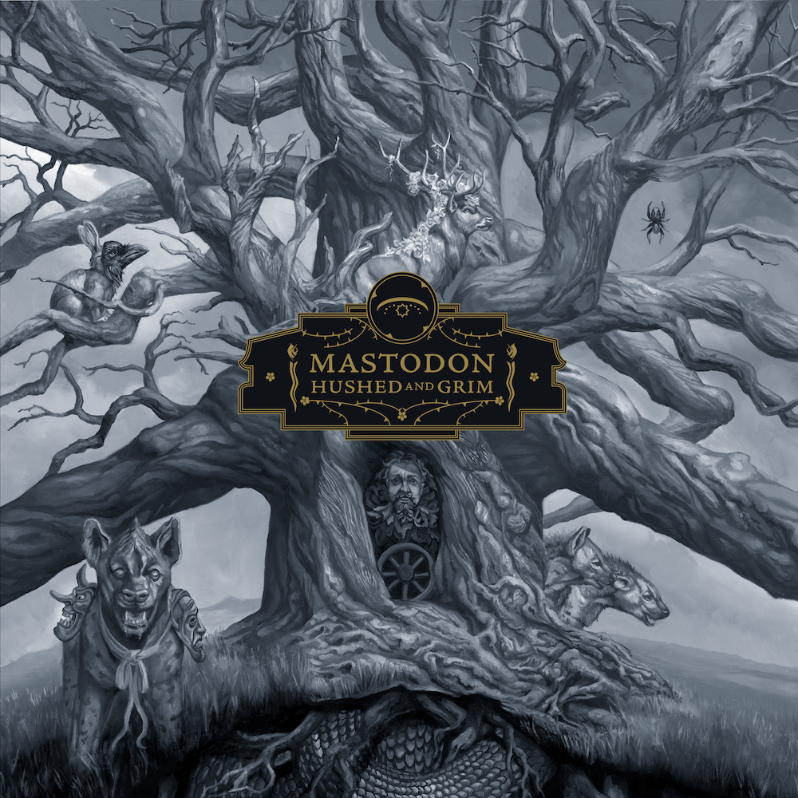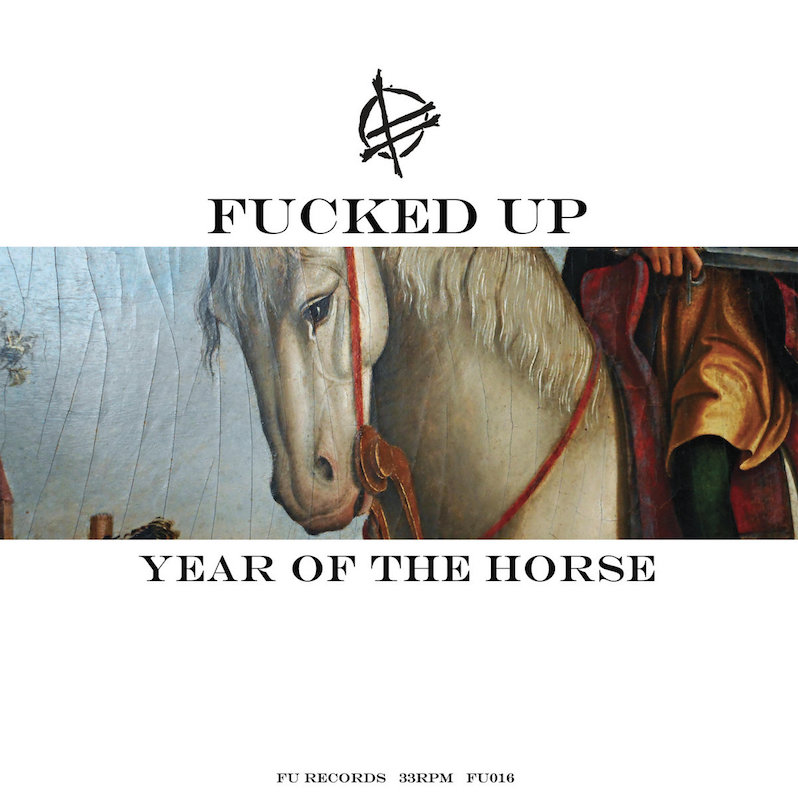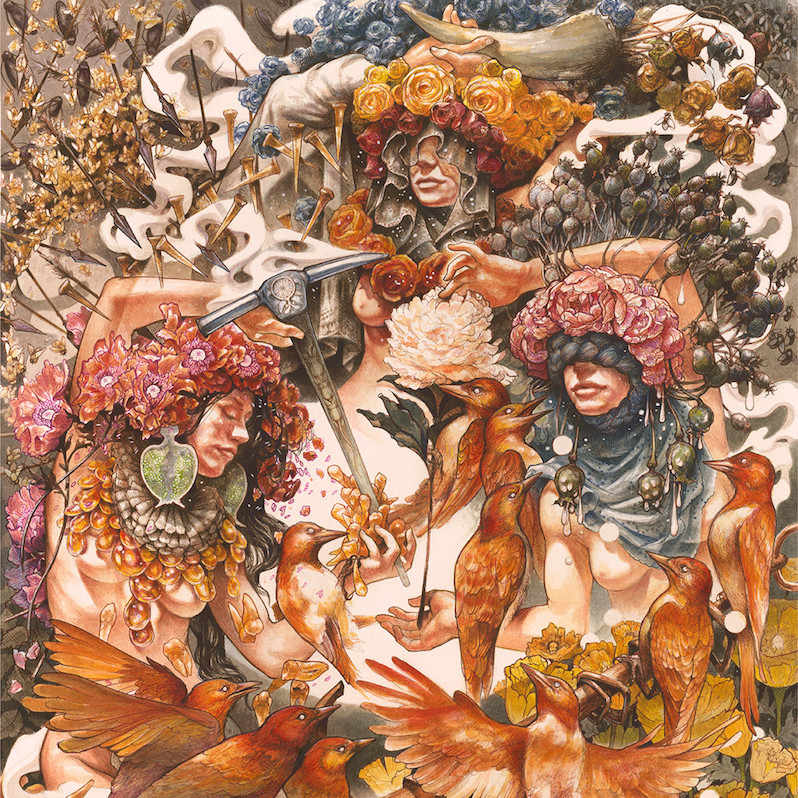Mastodon : Hushed and Grim

It is fair, from a certain perspective, to view a new Mastodon album with an amount of suspicion. The common narrative around this band is that there was a downward turn in quality sometime shortly after Crack the Skye, with records from The Hunter forward failing to live up to the early heights of the band. The problem with this perspective is it is, quite simply, wrong. Mastodon certainly shifted following The Hunter, which in retrospect feels as much like the band self-destructing as it was also the seeds of this new phase of the band’s career. The history around that record has been documented extensively, from profound grief of the death of Brent Hinds’ brother to struggles with addiction and substances as well as a growing desire to explore the more psychedelic and rock elements the group had been introducing into their sound on Blood Mountain—those elements themselves having roots back to the debut EP.
The view that the records of Once More Round The Sun forward have been lesser efforts is built less on the inherent qualities of those records but the same bugbear that longer-lived groups always deal with, where even the most open-minded of fans of earlier work sometimes struggle to view the group in a new light or capable of new colors. In truth, while those later two records may not necessarily scrape the same towering heights as that magical run from Leviathan to Crack the Skye, they show a band that has over time mended the wounds that left them strained for some time, using side projects to develop sonic ideas and embrace the elements of psychedelia and rock always present, ultimately producing mid-career works that feel closer to the heart of what this band is.
Hushed and Grim follows in this latter mode, building off of the sonic density and lushness from the past two records including the increased emphasis on keyboards both in a supplemental and lead role. At their very heart of hearts, Mastodon strives to be a hard rock ’70s Genesis; through this lens, it’s hard to view Hushed and Grim—their first double album—as anything but a success. These songs are replete with ear-popping sonic details, ear candy sprinkled judiciously over the entire 15-track set. The most impressive component perhaps is how comfortably the 90-ish minutes pass. This has been a year of phenomenal double records, such as Fucked Up’s Year of the Horse and Fire-Toolz’ Eternal Home, company this new Mastodon record comfortably sits with. In fact, this record almost had the same coveted spot as the new Fire-Toolz as Album of the Week; our decision had more to do with wanting to put the shine on a younger artist to give them an extra push than because this album doesn’t live up to lofty heights.
The material here feels unencumbered by expectation and, in turn, freer to exist in its own progressive music world. For years before Mastodon broke through and made the term kosher again, the world of prog was functionally a satellite revolving around the earth, as distant to affairs of the musical development of modernity as the moon is from local politics. While their breakthrough brought the long-sought return of critical acclaim to this wonderful genre, it also unfortunately brought the same kinds of pressures that other genres undergo, being witnessed and consumed and cross-analyzed to death by many voices who may or may not even have the best interests of the work at heart. Prior to this record, Emperor of Sand was their late-career highlight; before that, Once More Round The Sun. The upward trajectory continues here, being as comfortably better than the already excellent Emperor of Sand as it was from the inventive and vivacious Once More Round The Sun, itself better than the admittedly middling and confused mid-life crisis album The Hunter. The best way to summarize Hushed and Grim would be as if The Hunter were recapitulated through the eyes of Crack the Skye, a set of varied and more rock-driven songs enhanced by the number of side endeavors all four members have embarked upon in intervening years but with the same sense of emotional heft the group brought to their rightfully-lauded record in memoriam of Brann Dailor’s dearly departed sister. This sense of returning to a previous mode but with lessons learned along the way was recently carried out to great success by another of Mastodon’s peers; it is hard not to see Baroness’ record Gold and Grey (or Orange in the better world we were denied) being a similar attempt to redo the otherwise scattered Yellow and Green.
It helps, of course, that this is perhaps the best sounding record of Mastodon’s career. They have always shot for panoramic and deeply cinematic progressive rock, attempting to evoke the same Mellotron-soaked spiritual lightning as The Lamb Lies Down on Broadway and Close to the Edge and all the other very best of the genre. Looking back, it’s hard not to feel that they were somewhat held back by their punkish roots, however, with the sonic field afforded to them by their early producers creating records that crackle like heavy metal lightning certainly but lack the kind of utter swarming vastness that prog at its space-gazing peak is capable of. Crack the Skye was the real turning point for the group in terms of mastering the subtleties of their ideal soundfield, and the records since then feel at times to have stepped forward as much as backward in their various experiments to perfectly frame this band. David Bottrill, legendary producer of groups like Rush, Tool and Peter Gabriel, has done thus far the very best job I’ve ever heard done for Mastodon. This is no small feat; Brendan O’Brien, who worked with the band on Crack the Skye and the later Emperor of Sand, produced high-water mark production for Mastodon and is a major component of why they were able to break through to so many people who otherwise don’t like heavy metal or heavy rock at all. But this is, in a word, better, like nearly every other aspect of this record.
None of this even begins to mention the sense of emotional gravitas and weight of this record. The band has been heavy before, obviously, but only on Crack the Skye and Emperor of Sand, two other records built around the theme of grief, have they been this consistently meditative and profound in their sentimentalism for the span of an entire album. The framing here accounts for that: inspired by the death of yet another dear friend, Hushed and Grim places its lens now not on the sense of grief of the living as per Crack the Skye‘s deathward journey to rescue the soul of a loved one nor even into the eyes of the dying as per Emperor of Sand‘s death sentence desert journey cancer parable. Instead, Hushed and Grim takes place seemingly in the death bed itself, the days and hours before the fatal moment rather than the questioning months of a terminal diagnosis, before transitioning in great prog fashion through the wormhole of darkness to the state of being dead itself. The songs focus much like the Tibetan Book of the Dead on the soulside journey of the recently dead, witnessing truly the pain and hurt and sorrow we have caused, only able to attain a past life of any kind after reckoning with what we have done. For any who’ve experienced suicidality or the death-like terror of a frightful diagnosis or even meditations on the recently dead and if they know all of who they were, the bad as well as the good, this sentiment is a profoundly troubling one, one that’s motivated doom metal and the darker fringes of folk and country for decades now. Hushed and Grim is a record of four men staring down their fifties witnessing each death around them as a reflection of a potential inward death, channeling the death-gazing meditations of our worth and actions into the music as much as the lyrics. It is profoundly affecting; more than once while listening, I began to cry at my desk.
Hushed and Grim is the Mastodon I fell in love with years ago, listening to Leviathan on repeat while driving my family back and forth from the hospital to visit my sick father. This is thunder and lightning, the primal roar of the earth and the cold echo of space; this is the heat of the human heart suspended in otherwise confused darkness. There are a number of people who likely won’t give it the time of day due to a misguided sense that the band has lost the plot; for those of us who’ve witnessed them rebuild themselves into greatness once again, it is the greatest document of this second phase of the magical and rightly storied band’s career.
Label: Reprise
Year: 2021
Similar Albums:
Langdon Hickman is listening to progressive rock and death metal. He currently resides in Virginia with his partner and their two pets.




